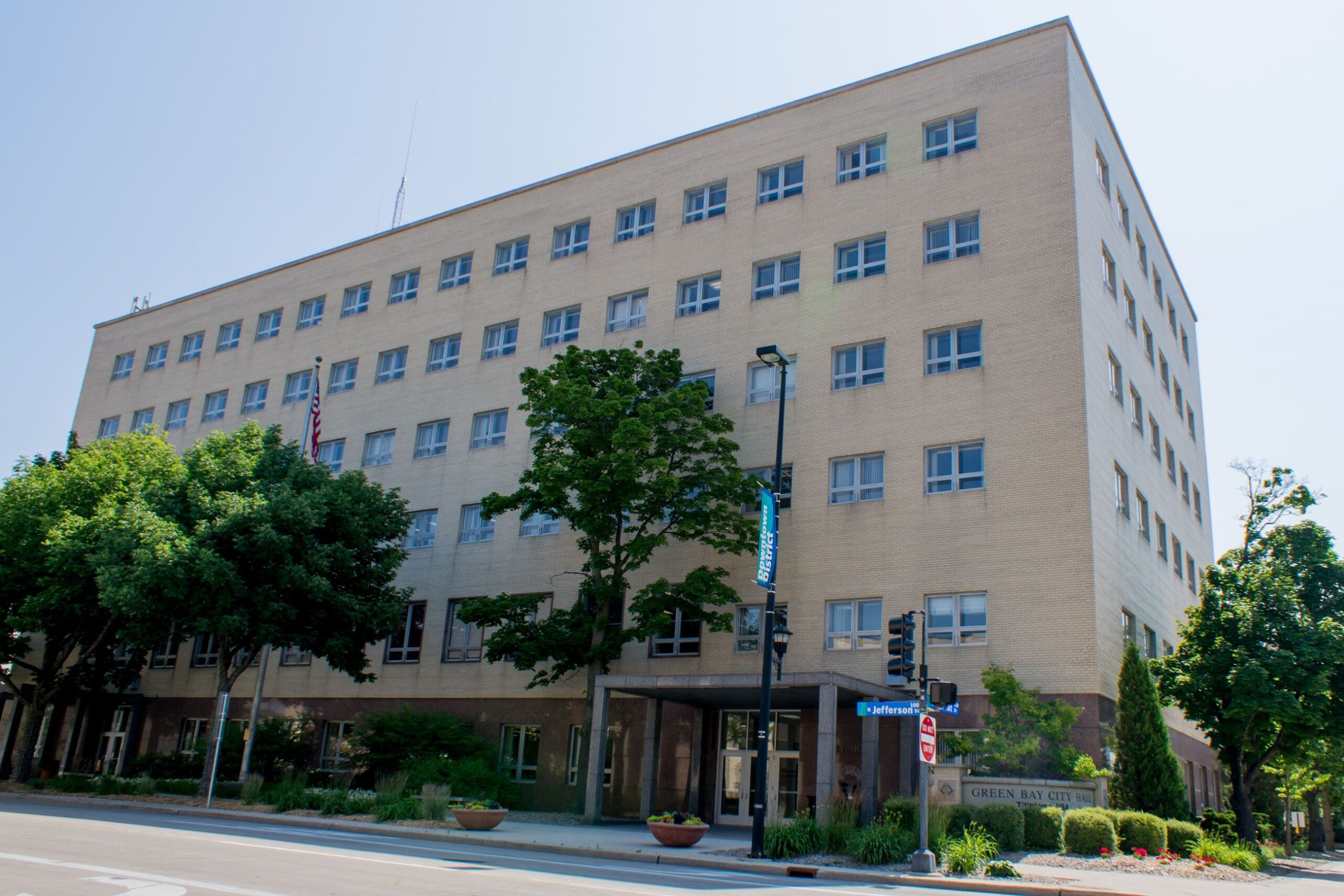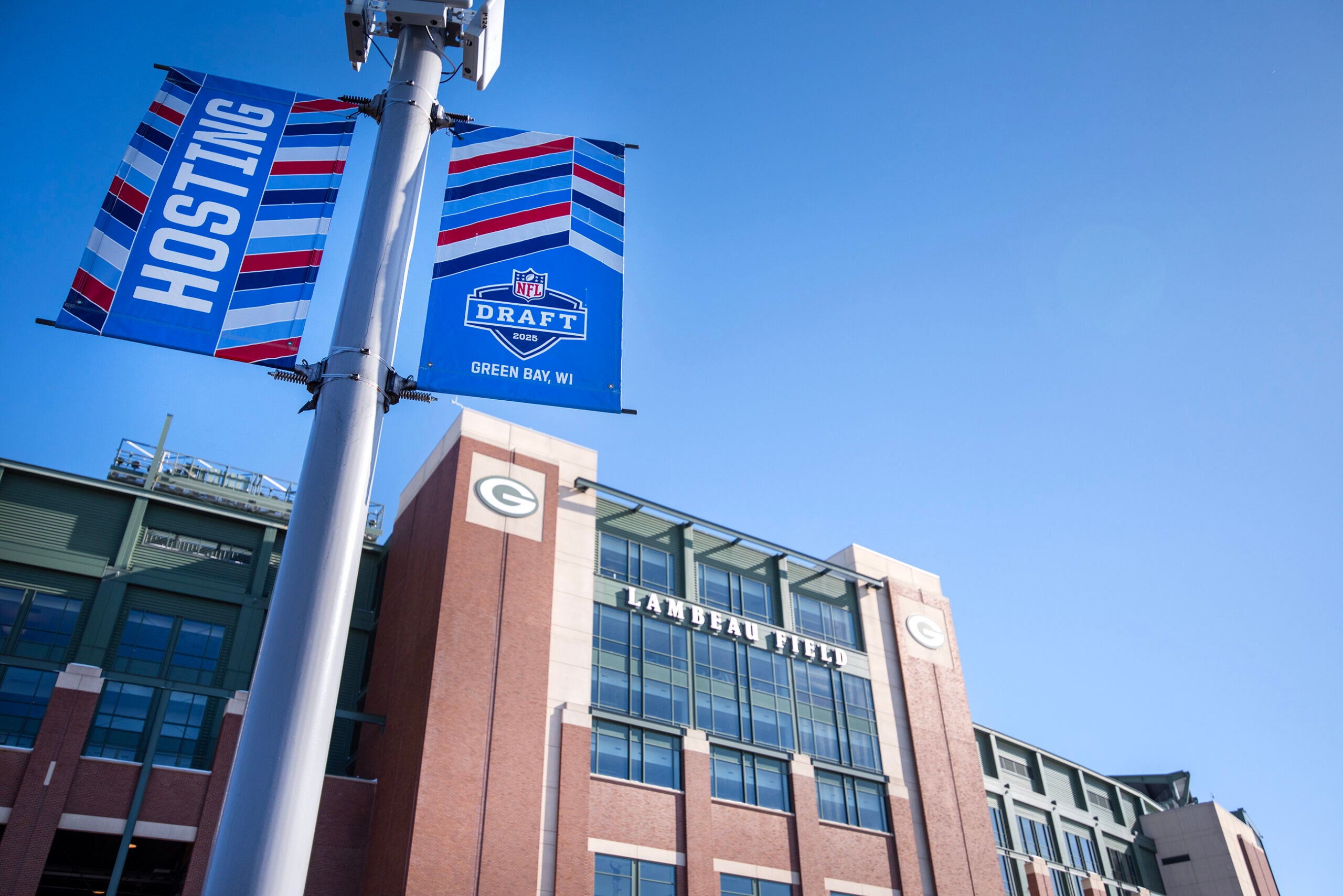The city of Green Bay’s use of audio recording devices in public areas of city hall has sparked a controversy and led to threats of legal action.
Green Bay installed audio recording devices in three of the 14 security cameras in city hall starting in late 2021. Those three cameras are located in hallways outside the city council chambers, the mayor’s office and the city clerk’s office, according to the city.
Joe Faulds, chief of operations for the city of Green Bay, said the devices were installed based on security concerns by staff and the public. He said staff were notified when the recording devices were installed.
Stay informed on the latest news
Sign up for WPR’s email newsletter.
But no signs were installed near the devices letting the public know they could be recorded. And critics of the move are calling the audio recording an intrusive, and possibility illegal, violation of privacy.
At a Green Bay Common Council meeting last week, Alder Chris Wery called on the city to remove the devices, saying they were installed without notice to the public or the council. He characterized the audio recording as spying.
“In a flagrant flaunting of federal and state law in direct defiance of our own city policy, audio recording devices are present at city hall,” Wery said. “Anyone who approved this blatant disregard for privacy should resign or be severely reprimanded.”
Wery said the city should immediately remove the audio equipment, create an ordinance related to audio surveillance and review how the devices were approved without the council’s knowledge.
Months before Wery spoke out at the meeting, state Sen. André Jacque, R-De Pere, said he heard from members of the public that the city may be using the recording devices.
“I was just floored that anybody could think that this was OK,” Jacque said. “Either the lack of foresight or the intentional effort to keep the information from getting to city aldermen was really surprising.”
On Monday, an attorney for the Wisconsin State Senate sent a letter to the city calling for the removal of all audio devices from public areas and the destruction of the recordings.
The letter, written by Attorney Ryan Walsh, said the state Senate is willing to take the city to court if it does not comply with the requests.
“This surveillance activity is not only disturbing. It is unlawful,” Walsh wrote. “The State Legislature, from which the city of Green Bay derives its authority, has never delegated this power to it. And it never would.”
City Attorney Joanne Bungert said Tuesday that the city doesn’t plan to remove the recording devices, but will add signage. She said deleting past recordings could violate the state’s open records law because it would be destroying a public record.
Green Bay’s announcement that it would install signage came after a memo from the Wisconsin Legislative Council, requested by Jacque, stated that without such signage, it would be difficult to determine if a party had given “implied consent” to the recording.
However, the city said in a statement that the memo did not “detail serious legal concerns” about its use of recording devices and showed “security cameras with audio capabilities do not violate Wisconsin’s Electronic Surveillance Control Law.”
ACLU says city’s use of audio devices is ‘legally dubious,’ unethical
In Wisconsin, only one person who is part of a conversation needs to consent to the conversation being recorded. Wisconsin’s status as a “single-party consent” state makes Green Bay’s use of audio equipment in public areas of city hall “legally dubious,” according to Jay Stanley, a senior policy analyst with the American Civil Liberties Union.
“From a legal standpoint, it is a little unclear how the courts would rule — especially when it comes to the key question of whether you have a reasonable expectation of privacy,” Stanley said.
He said people having a private conversation in a public hallway should “have a reasonable expectation of privacy” and should not “have to suspect everywhere you go that there might be a microphone recording you.”
“This is the first time that I’ve heard of microphones in places like hallways in a government building,” Stanley said.
He said he believes the ethics surrounding the audio equipment in city hall are more black and white than the issue of legality.
“We don’t want to start allowing surveillance cameras, which are in many public places in modern life, to be recording audio,” he said. “You could be walking down the street with an old college friend, talking about wild times in your youth. The video just shows two people walking down the street, but the audio can be very compromising.”
Faulds, the city operations chief, said the audio recordings aren’t continually monitored. He said the audio recordings would only be reviewed if there was an emergency situation or accident.
City attorney Bungert said the city’s audio devices are not in segregated areas where hushed, private conversations usually take place.
“Even if they were to happen, these audio devices are not sensitive enough to pick up those types of conversations,” she said.
Bungert said private or sensitive information picked up by one of the city’s recording devices likely wouldn’t be released as part of open records requests, similar to how the police department can withhold private or sensitive information.
“If there is a recording that potentially has information that’s private or exempt, the balancing tests would be applied and or any other exemptions would be applied to withhold that particular information or to redact it,” she said.
The debate around Green Bay’s use of audio recording devices comes as Mayor Eric Genrich seeks reelection. Three opponents have filed papers to be placed on the primary ballot this month.
Genrich is a former Democratic state representative and has received campaign contributions from the Democratic Party of Wisconsin, according to WLUK-TV. Meanwhile, the fundraising front-runner among his opponents is Brown County Administration Director Chad Weininger, a former GOP state representative who has received campaign contributions from Republicans.
Wisconsin Public Radio, © Copyright 2025, Board of Regents of the University of Wisconsin System and Wisconsin Educational Communications Board.




